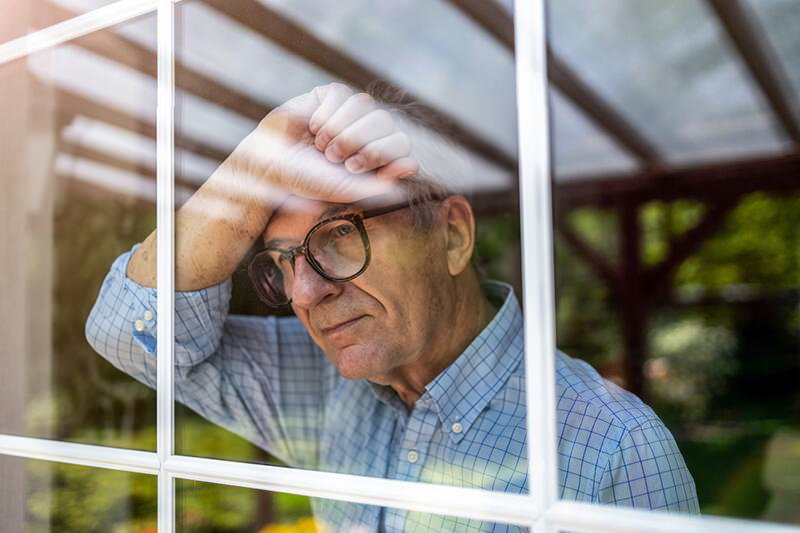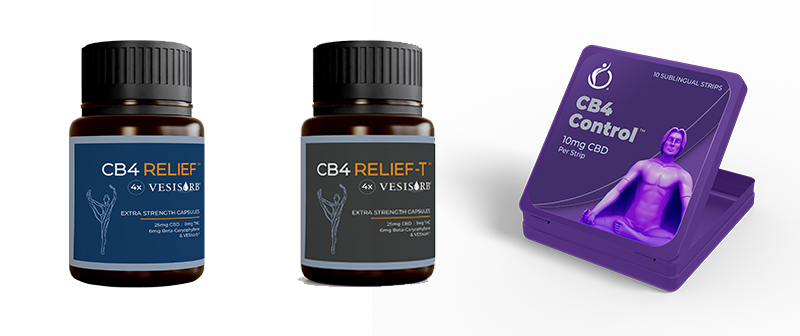Why People Are Turning to CBD For Anxiety, PTSD & Mental Health

CARP RECOMMENDED PARTNER SPONSORED CONTENT
Even before the pandemic, many people experienced anxiety from the pressures of work, family, finances and world events. The pandemic has only worsened this anxiety. You may recognize the common symptoms: excessive worrying, restlessness, difficulty sleeping, trouble concentrating. Today, people are seeking relief with CBD. Here’s why.
CBD (cannabidiol) is an active cannabinoid compound that’s extracted from cannabis. Unlike the cannabinoid THC (tetrahydrocannabinol), CBD doesn’t cause a euphoric high. In fact, CBD can actually reverse excessive euphoria, paranoia and anxiety associated with ingesting higher-dose THC.1
There’s been exciting research into how CBD can help with stress, anxiety and PTSD.
At least 10 clinical studies and 30 preclinical studies have examined CBD’s anti-anxiety effects, and it has proven to be an effective treatment for anxiety symptoms, reducing both behavioural and physiological signs.2,3,4 CBD has also been shown to help with insomnia and replaying traumatic memories.4,5 While CBD in moderate doses (10 mg sublingually or orally) may be effective for anxiety, CBD combined with low-dose THC is effective in disrupting REM sleep and dreams, thereby reducing PTSD symptoms, especially nightmares.
CBD interacts with the body’s endocannabinoid system (ECS).
Evidence indicates important roles for the ECS in controlling anxiety, along with regulating sleep, memory and pain. Through the ECS, our bodies produce endocannabinoids. When they bind to endocannabinoid receptors attached to our cells (neurons and lymphocytes), they send a chemical message to the ECS that it needs to act.
CBD and THC are phytocannabinoids (i.e. cannabinoids produced by plants) that behave similarly to our bodies’ own endocannabinoids. Research is ongoing into exactly how CBD reduces anxiety. It may prevent endocannabinoids from breaking down or bind to certain endocannabinoid receptors and other receptors, including serotonin (5-HT1A) receptors. CBD also decreases blood flow in the areas of the brain associated with anxiety, seems to alter serotonin signals, and may reduce levels of the stress hormone cortisol.2,4,6
Evidence suggests that CBD could be a safe alternative for anxiety as it does not cause sedation.
Anti-anxiety, or anxiolytic, medications called benzodiazepines (e.g. lorazepam, alprazolam, diazepam) are addictive, cause drowsiness, can’t be mixed with alcohol, can slow breathing and cause fatal overdose — which are not concerns with CBD. Similarly, CBD doesn’t have the negative side-effects of selective serotonin reuptake inhibitors (e.g. fluoxetine, fluvoxamine). CBD is generally well tolerated with a good safety profile.7
Oral CBD is usually poorly absorbed.
While taking CBD orally avoids the stigma and harmful byproducts of smoking or vaping, oral CBD tends not to be as effective as inhaled because only 8-10% of the CBD is absorbed into the bloodstream (vs. 50-60% when inhaled). Absorption can improve to 40-45% when administered with VESIsorb® oral or VersaFilm® sublingual technologies. Furthermore, most oral products contain little or no cannabidiolic acid (CBDA), which has stronger serotonin receptor activity and may play a more important role in managing anxiety in combination with CBD versus CBD alone.
Opticann’s new revolutionary CBD products have rapid-acting, superior absorption.
Based on advanced pharmaceutical drug-delivery technologies, Opticann’s optimized cannabinoids deliver results consistently and in convenient forms CB4 Control strips are the first CBD- and CBDA-containing filmstrip developed with VersaFilm®, allowing faster absorption into the bloodstream from under the tongue. CB4 Control strips can deliver both CBD and CBDA quickly and with better total absorption than conventional oils and capsules and can be taken as needed. The strips dissolve quickly and absorb in less than 5 minutes. Each strip contains 10 mg total CBD (6 mg CBD and 4 mg CBDA) and less than 0.2 mg THC.
For chronic daily relief, Opticann’s softgels provide 25 mg of high-potency CBD formulated with VESIsorb®, clinically proven to deliver 4.5 times better absorption 3 times faster (1 hour vs. 3 hours) than conventional CBD capsules.8 This higher absorption rate means reliable relief while taking the capsules less often than other products. CB4 Relief contains no THC and is recommended for daytime use. CB4 Relief-T contains low-dose THC (0.75 mg), making it suitable for evening use before bed.

Talk to your doctor, pharmacist and Opticann’s Patient Care Team about Opticann’s products.
They can advise you on dosage, drug interactions, precautions and contraindications. Learn more and register as a patient at opticann.ca
CARP members receive 15% off all products purchased through opticann.ca


References
1 Isegar, T.A., & Bossong, M.G. (2015). A systematic review of the antipsychotic properties of cannabidiol in humans. Schizophr Res,162(1-3):153-61. https://doi.org/10.1016/j.schres.2015.01.033
2 Health Canada. (2018). Information for health care professionals: Cannabis (marihuana, marijuana) and the cannabinoids. https://www.canada.ca/en/health-canada/services/drugs-medication/cannabis/
information-medical-practitioners/information-health-care-professionals-cannabis-cannabinoids.html
3 National Academies of Sciences, Engineering, and Medicine. (2017). The health effects of cannabis and cannabinoids: The current state of evidence and recommendations for research. https://doi.org/
10.17226/24625
4 National Institute on Drug Abuse. (2015). The biology and potential therapeutic effects of cannabidiol. https://archives.drugabuse.gov/testimonies/2015/biology-potential-therapeutic-effects-cannabidiol
5 Bitencourt, R.F., & Takahashi, R.N. (2018). Cannabidiol as a therapeutic alternative for post-traumatic stress disorder: From bench research to confirmation in human trials. Front Neurosci, 12: 502. https://doi.org/10.3389/fnins.2018.00502
6 Shannon, S. et al. (2019). Cannabidiol in anxiety and sleep: A large case series. Perm J, 23: 18-041. https://doi.org/10.7812/TPP/18-041
7 World Health Organization. (2018). Cannabidiol (CBD): Critical review report. https://www.who.int/medicines/access/controlled-substances/CannabidiolCriticalReview.pdf
8 Knaub, K. et al. (2019). A novel self-emulsifying drug delivery system (SEDDS) based on VESIsorb® formulation technology improving the oral bioavailability of cannabidiol in healthy subjects. Molecules, 24(16): 2967. https://doi.org/10.3390/molecules24162967.